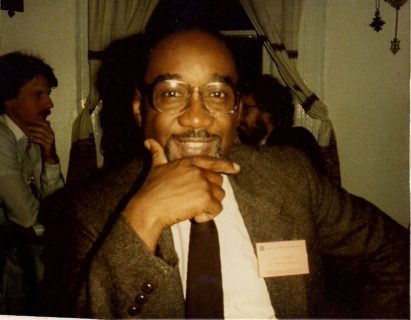Article begins

Image description: A dark-skinned man wearing glasses and a suit smiles at the camera, hand on his chin.
Caption: Ira E. Harrison at the Association of Black Anthropologists’ celebration of St.Clair Drake’s life’s work and 75th birthday, during the American Anthropological Association Annual Meeting in Washington, DC, December 1985.
1933–2020
Ira E. Harrison, activist, poet, pioneer, mentor, and professor emeritus of anthropology at the University of Tennessee, Knoxville (UTK), passed away on April 27, 2020. He leaves an extraordinary legacy of advocacy, scholarship, and service in the community.
Born in Coatesville, Pennsylvania, on June 1, 1933, Harrison grew up in Syracuse, New York. His parents, both social workers in Syracuse communities, were influential in his direction of solving social problems and engaging in activism. He earned a BA at Morehouse College in Atlanta, Georgia (1951–1955), majoring in sociology, with minors in psychology, English, and the humanities. He served in the US Army as a medical aidman in Colorado and Germany (1956–1957). After returning to Atlanta University, in 1959 Harrison earned an MA in sociology and anthropology. In 1967, he earned a PhD in anthropology/sociology and metropolitan area studies from Syracuse University’s Maxwell School. He is also a 1971 graduate of Johns Hopkins University’s School of Hygiene and Public Health with a master’s degree in public health.
His life’s work covered a wide range of research: migrant farm workers, religion, African Americans and race relations, medical and applied anthropology, public health, and Africa, particularly south of the Sahara. His first publication, The Storefront as a Revitalization Movement (1964), examined black storefront churches. Harrison authored and co-authored several books, articles, chapters, and reports on public health, including Observations in a Black Neighborhood Clinic: A Progress Report (1969), which helped pave the way for the US Office of Economic Opportunity to fund neighborhood health centers, Traditional Medicine (1976) coauthored with Sheila Cosminsky, The Agricultural Migratory Farm Labor System as an Adaptive Mechanism for Afro-Americans (1978), Ethnicity and the Health Belief Systems (1994) coauthored with L. Jack and Collins Airhihenbuwa, and Traditional Medicine in Africa (1993) coauthored with Collins Airhihenbuwa.
Harrison was one of the founding members of the Association of Black Anthropologists (ABA) and advocated equal representation for Black faculty and staff as a member of the UTK’s Black Faculty and Staff Association (BFSA). He was passionate about recording the history and contributions of Black anthropologists, resulting in co-editing two anthologies, African American Pioneers in Anthropology (1998) coauthored with Faye V. Harrison, and The Second Generation of African American Pioneers in Anthropology (2018) co-authored with Deborah Johnson-Simon and Erica Williams. As ABA’s first archivist, he sought to ensure the preservation of the accomplishments and works of ABA members.
He was the recipient of the AAA’s Distinguished Fellow Award for his 50-year membership and the 2010 ABA Legacy Scholar Award. Harrison’s achievement also resonated in the artistic world of oratory. He has published several books of poetry, A Potpourri of Poetic Expression, Poems and Reflections, and The Spirit of First Church: Poetic Inspiration. He was the second African American president of the Georgia Poetry Society and member of the Atlanta Southwest Poetry Group.
Ira E. Harrison is survived by his three children, Meri-Louise Harrison, Ira Michael Harrison, and Timothy-Scott Harrison; his wife, Claire Crooks-Harrison; five grandchildren, Marcus Brandon Harrison, Caysey Harrison, Ashley Harrison, Julissa Harrison, and Andrew Harrison; two great granddaughters, Apriel Patton and Zoe-lee Harrison; and a host of cousins, nieces, nephews, extended family, and friends. He will be greatly missed.
(Alisha R. Winn)
Cite as: Winn, Alisha. 2020. “Ira E. Harrison.” Anthropology News website, June 12, 2020. DOI: 10.1111/AN.1422

